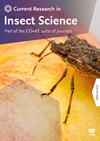Molecular mechanisms and comparative transcriptomics of diapause in two corn rootworm species (Diabrotica spp.)
IF 2.7
Q1 ENTOMOLOGY
引用次数: 0
Abstract
Diapause is a programmed developmental arrest that can occur at any developmental stage depending on species, but the mechanisms that underscore embryonic diapause are poorly understood. Here, we identified molecular mechanisms underscoring distinct phases of diapause in the Diabrotica spp. complex. This species complex includes economically significant agricultural pests, notably the western corn rootworm (WCR) and northern corn rootworm (NCR), which cause major losses in maize production. Rootworms undergo an obligate embryonic diapause to synchronize their life cycles with host plants, and we sequenced transcriptomes from both species at five time points (pre-diapause, diapause initiation, diapause maintenance, diapause termination, and post-diapause). Our results indicate that transcriptional regulation is dynamic during diapause. Diapause initiation involves shutdown of the cell cycle by downregulating cyclin-related genes, downregulation of aerobic metabolism, with concurrent upregulation of stress-related genes, especially heat shock proteins, the proteasome, and immune-related genes. During post-diapause development, there is a dramatic activation cellular respiration, which may be controlled by insulin signaling. Comparative transcriptomic analyses between WCR and NCR indicated that while many gene expression changes were conserved across species, overall gene expression profiles were distinct, indicating that many transcriptional changes are species-specific, despite the close phylogenetic relationship and phenotypic similarity between these species. This study sheds light on the suite of mechanisms that allow some organisms to pause the symphony of cellular events that occur during embryonic development and persist for several months as a tiny egg. Further, the mechanisms identified here may contribute to further research and pest management efforts in this economically important pest group.
两种玉米根虫滞育的分子机制和比较转录组学。
滞育是一种程序性的发育停滞,可以发生在任何发育阶段,取决于物种,但强调胚胎滞育的机制尚不清楚。在这里,我们确定了在Diabrotica spp.复合体中强调不同阶段滞育的分子机制。该物种群包括具有重要经济意义的农业害虫,特别是西部玉米根虫(WCR)和北部玉米根虫(NCR),它们对玉米生产造成重大损失。根虫经过专性的胚胎滞育以与寄主植物同步其生命周期,我们在五个时间点(滞育前、滞育起始、滞育维持、滞育终止和滞育后)对两种物种的转录组进行了测序。我们的研究结果表明,在滞育期间转录调控是动态的。滞育起始涉及通过下调周期蛋白相关基因、下调有氧代谢来关闭细胞周期,同时上调应激相关基因,特别是热休克蛋白、蛋白酶体和免疫相关基因。在滞育后发育过程中,细胞呼吸发生了剧烈的激活,这可能受胰岛素信号的控制。WCR和NCR之间的转录组学比较分析表明,尽管WCR和NCR之间存在密切的系统发育关系和表型相似性,但许多基因表达变化在物种间是保守的,但总体基因表达谱是不同的,这表明许多转录变化是物种特异性的。这项研究揭示了一系列机制,这些机制允许一些生物体暂停胚胎发育期间发生的细胞事件,并作为一个微小的卵子持续几个月。此外,这里确定的机制可能有助于对这一经济上重要的有害生物群体的进一步研究和有害生物管理工作。
本文章由计算机程序翻译,如有差异,请以英文原文为准。
求助全文
约1分钟内获得全文
求助全文
来源期刊

Current Research in Insect Science
Agricultural and Biological Sciences-Animal Science and Zoology
CiteScore
3.20
自引率
0.00%
发文量
22
审稿时长
36 days
 求助内容:
求助内容: 应助结果提醒方式:
应助结果提醒方式:


